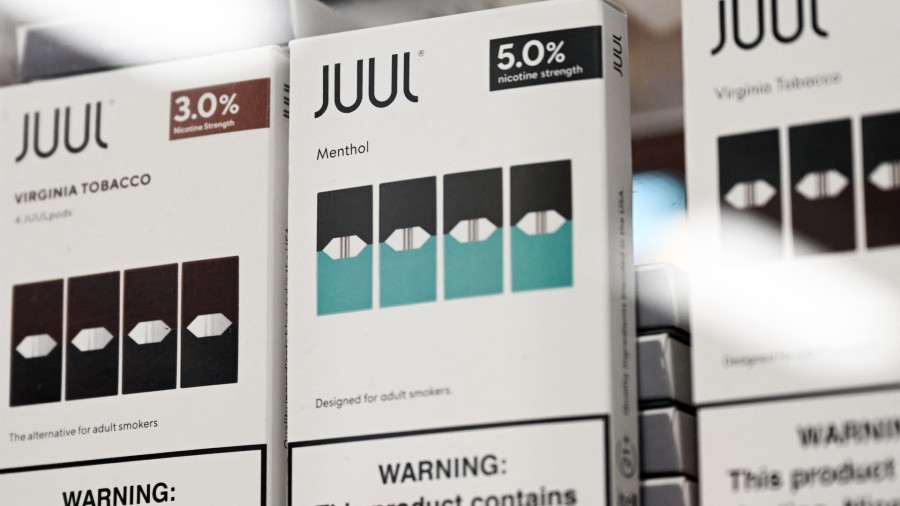Tulalip Tribes sue e-cigarette company, Juul, for illegally targeting youth
Jul 11, 2022, 5:17 PM

JUUL Labs Inc. Virginia tobacco and menthol flavored vaping e-cigarette products are displayed in a convenience store on June 23, 2022 in El Segundo, California. (Photo by PATRICK T. FALLON/AFP via Getty Images)
(Photo by PATRICK T. FALLON/AFP via Getty Images)
The Tulalip Tribes of Washington have sued e-cigarette giant Juul Labs Inc. (JLI), alleging the company and its affiliates illegally targeted teenagers across the sovereign Indian nation north of Seattle with deceptive ads about the addictiveness of its product.
The tribes’ 316-page complaint, filed in U.S. District Court in Seattle last week, alleges that JLI and its affiliates “adopted the cigarette industry’s playbook” to hook a new generation of young tribal members on nicotine.
“JLI and the Management Defendants sought to grow the market share of nicotine-addicted e-cigarette users beginning by at least early 2015 through two related schemes,” the complaint read. “First, by designing an unsafe product with a high nicotine content that was intended to addict, or exacerbate the addiction of, its users. Second, by marketing and misbranding that potent product to the broadest possible audience of potential customers, including young people whose addiction would last the longest and be the most profitable for the Defendants.”
As a result, use of Juul’s vaping products “became rampant” among Tulalip tribal youth, with the percentage of 12th graders reportedly consuming nicotine nearly doubling between 2017 and 2018, according to the lawsuit.
Juul delivers nicotine to the bloodstream so efficiently that the company’s engineers explored features to stop users from ingesting too much nicotine too quickly. One idea was to shut down the device for a half hour or more after a certain number of puffs, according to Chenyue Xing, a former Juul scientist.
The concern stemmed from the fact that a Juul – unlike a cigarette – never burns out.
“But upper management rejected the concerns that the scientists raised, and the company never produced an e-cigarette that limited nicotine intake,” the court documents read.
According to the suit, cigarette companies have known for decades that flavored products are key to getting young people to acclimate to nicotine. In a 1972 Brown & Williamson memorandum called “Youth Cigarette – New Concepts,” it specifically noted it is a “well-known fact that teenagers like sweet products.”
A 1979 Lorillard memorandum concluded that younger customers would be “attracted to products with ‘less tobacco taste,’” and even proposed borrowing data from the “Life Savers” candy company to determine which flavors enjoyed the widest appeal among youth.
In 2009, the FDA banned flavored cigarettes (other than menthol) under the Family Smoking Prevention and Tobacco Control Act of 2009. “Flavored cigarettes attract and allure kids into addiction,” Health and Human Services Assistant Secretary Howard Koh, M.D., MPH, said at a news conference announcing the ban.
In January 2020, the FDA banned flavored e-cigarette pods, other than “Tobacco” and “Menthol” flavors, in response to “epidemic levels of youth use of e-cigarettes” because these products are “so appealing” to children.
FDA bans Juul e-cigarettes tied to teen vaping surge
Alongside using kid-friendly flavors, JLI’s design is slick and high-tech, which makes it appealing to youth. Cited as the “iPhone of e-cigarettes,” JLI co-founder Adam Bowen drew on his experience as a design engineer at Apple Inc. to make JUUL resonate with Apple’s popular aesthetics. This high-tech style made JUULs look “more like a cool gadget and less like a drug delivery device,” the suit read.
In 2018, then Surgeon General Jerome Adams issued a statement against e-cigarettes when operated by younger users.
“The recent surge in e-cigarette use among youth, which has been fueled by new types of e-cigarettes that have recently entered the market, is a cause for great concern,” Adams said in a prepared statement. “We must take action now to protect the health of our nation’s young people.”
In April, Washington Attorney General Bob Ferguson announced that JLI must pay $22.5 million to resolve Ferguson’s lawsuit against the e-cigarette company. The lawsuit asserts that Juul violated the law when it designed and marketed its products to appeal to underage consumers and deceived consumers about the addictiveness of its product.
JUUL to pay Washington state $22.5 million over unlawful advertising directed toward kids
JLI admitted no wrongdoing, but paid the $22.5 million in a settlement with the state. It was the fourth such settlement with states by the company. In November 2021, JLI settled for $14.5 million with state prosecutors in Arizona, just months after agreeing to pay $40 million in North Carolina.
In a statement posted online in April, the company said its settlement with Washington and other states was “another step in our ongoing effort to reset our company and resolve issues from the past.”
“The terms of the settlement are consistent with our current business practices and past agreements to help combat underage use while offering adult smokers access to our products as they transition away from combustible cigarettes,” the statement read.













